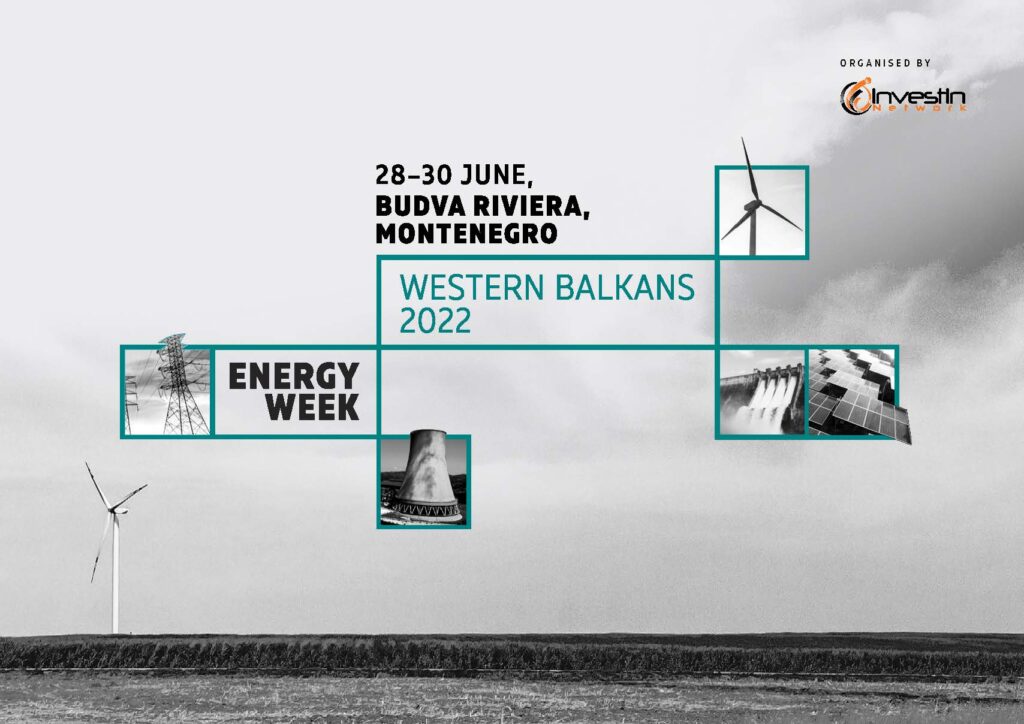A great opportunity arises for Serbia, Montenegro, North Macedonia, Albania and Kosovo* to further develop their renewable energy production, as this summer’s Energy Week is announced! Invest In Network, a boutique consultancy based in the U.K. whose mission is to foster the deployment of renewable energy across Central Asia, the Black Sea and the Western Balkans regions is organizing a conference in Budva, Montenegro, this summer. Authorities and energy companies from the Western Balkans region will gather along with international financial institutions and major multinational investors, EPC and consultancy firms for a dialogue aimed at fostering foreign direct investment and development of renewable energy in the region. Our Partner Petar Mitrović will be among the participants, as well.
The Western Balkans Region boasts great potential when it comes to solar and wind energy as well as hydropower. Two solar projects have been awarded to a renewable energy developer in Albania in 2021. Serbia has also begun talks for solar power projects for the development of 1 GW of solar energy. Similar agreements have recently been signed in North Macedonia, Montenegro and Kosovo*, while the Republic of Srpska has also announced multiple solar power projects that will start as early as this spring.
The Balkans are a windy place, too! Serbia alone has over 2.7 GW of wind energy projects in the pipeline, and a 300 MW project in full swing, among others.
The Western Balkans also has the largest unexploited hydropower potential in Europe. Both large-scale and small-scale projects are undergoing throughout the entire region, despite sporadic breaks. State-owned power utilities Elektroprivreda Crne Gore and Elektroprivreda Srbije are negotiating over the joint construction of the 155 MW Komarnica HPP in Montenegro. In North Macedonia, nine bidders have gone into the second phase of the construction of the 333 MW Chebren HPP. Their final bids are anxiously anticipated for the end of January this year. In Serbia, two large-scale HPPs involving the construction of two pumped storage hydropower plants promise another 3,080 MW of energy. Atop all of this, Albania’s Power Corporation signed an agreement this year to begin early works for a 210 MW HPP on the Drin river.
CONFERENCE PROGRAMME
The conference starts on the 28th of June and the opening topics include the opportunities of the Western Balkans when it comes to clean energy and renewables, comparison of WB potential to that of Western Europe, ways to accelerate renewable energy deployment, how far WB countries are from reaching the Paris climate goals, attracting foreign investment, why building coal plants is still an option for some WB countries, setting coal phaseout dates and decentralizing energy generation. Talks will also cover financing clean energy projects in the Western Balkans, with emphasis on the costs of closing coal mines, lowering possible prices for investing in renewables, moving from a feed-in tariff scheme to an auction system, increasing investment attractiveness and the risks of it all. Planned projects or projects under development will also be discussed, as well as what needs to be done to grow the region’s wind power sector.
Day 2 promises more hot topics, such as the development of hydrogen energy strategies in the region, how to secure the capital needed to fund green hydrogen energy, regional and European partnerships and their importance in the development of hydrogen production in the region, and leading technologies for a hydrogen-based energy transition. The conference will also cover the most promising solar energy projects in the region and the preparation of electricity grids for rising shares of solar PV in the region. The organizers also planned a technical visit for June 30th.
Partner refers to an independent attorney at law in cooperation with Karanovic & Partners.
*This designation is without prejudice to positions on status and is in line with UNSC 1244 and the ICJ Opinion on the Kosovo declaration of independence.
The information in this document does not constitute legal advice on any particular matter and is provided for general informational purposes only.

